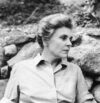One Art
POETRY FORMAT, 8 Feb 2021
Elizabeth Bishop – TRANSCEND Media Service
Alongside classics like Dylan Thomas’s “Do Not Go Gentle into that Good Night” and Sylvia Plath’s “Mad Girl’s Love Song,” “One Art” remains one of the greatest and most influential villanelles in the English language — sculptural masterworks of creative constraint, in which the virtuosity of language meets an exquisite mathematical precision in nineteen measured lines: five three-line stanzas and a final stanza of four lines, with the first and third line of the first stanza forming a refrain of alternating repetition across the remaining stanzas and then coming together into a chorus of a couplet in the closing verse. A haiku in the higher mathematics of meter.
— Maria Popova, Brain Pickings
************
The art of losing isn’t hard to master;
so many things seem filled with the intent
to be lost that their loss is no disaster.
Lose something every day. Accept the fluster
of lost door keys, the hour badly spent.
The art of losing isn’t hard to master.
Then practice losing farther, losing faster:
places, and names, and where it was you meant
to travel. None of these will bring disaster.
I lost my mother’s watch. And look! my last, or
next-to-last, of three loved houses went.
The art of losing isn’t hard to master.
I lost two cities, lovely ones. And, vaster,
some realms I owned, two rivers, a continent.
I miss them, but it wasn’t a disaster.
—Even losing you (the joking voice, a gesture
I love) I shan’t have lied. It’s evident
the art of losing’s not too hard to master
though it may look like (Write it!) like disaster.
Bishop died not long after composing “One Art,” having requested the last two lines of another poem of hers as an epitaph:
All the untidy activity continues,
awful but cheerful.
_________________________________________________
 Elizabeth Bishop was an American poet and short-story writer (born 8 Feb 1911-died 6 Oct 1979). She was Consultant in Poetry to the Library of Congress from 1949 to 1950, the Pulitzer Prize winner for Poetry in 1956, the National Book Award winner in 1970, and the recipient of the Neustadt International Prize for Literature in 1976. Wikipedia
Elizabeth Bishop was an American poet and short-story writer (born 8 Feb 1911-died 6 Oct 1979). She was Consultant in Poetry to the Library of Congress from 1949 to 1950, the Pulitzer Prize winner for Poetry in 1956, the National Book Award winner in 1970, and the recipient of the Neustadt International Prize for Literature in 1976. Wikipedia
Tags: Poetry
This article originally appeared on Transcend Media Service (TMS) on 8 Feb 2021.
Anticopyright: Editorials and articles originated on TMS may be freely reprinted, disseminated, translated and used as background material, provided an acknowledgement and link to the source, TMS: One Art, is included. Thank you.
If you enjoyed this article, please donate to TMS to join the growing list of TMS Supporters.

This work is licensed under a CC BY-NC 4.0 License.
What a wonderful contribution! I am going to email it to friends! Thank you!!!
Thanks for posting this. Villanelles can be tricky to write…but they reward us with memorability. Besides this one by Elizabeth Bishop and Dylan Thomas’s “Do Not Go Gentle Into That Good Night,” I would recommend Theodore Roethke’s “The Waking.”
Bishop was a good friend of my Creative Writing-Poetry Professor, Robert Lowell. He often cited her work–her insights, her craft.
My personal favorite poem of hers is “The Fish.”